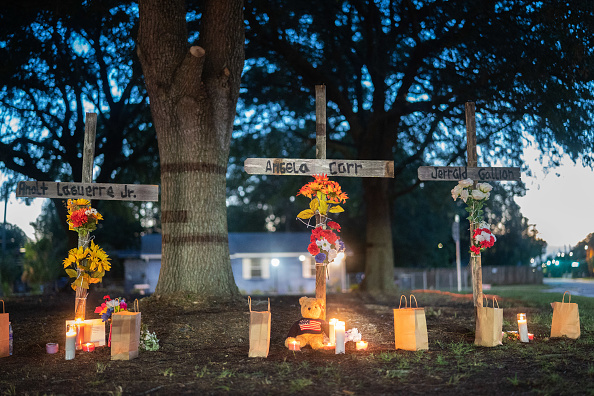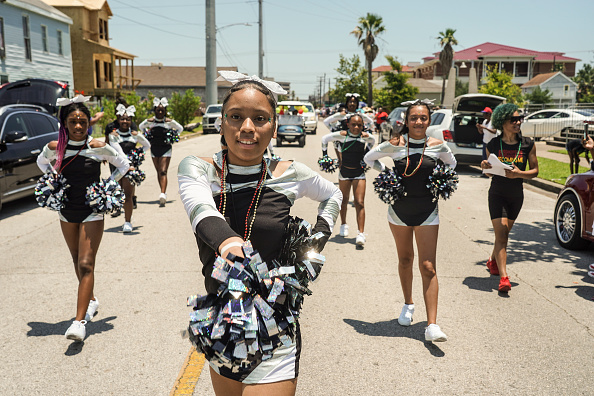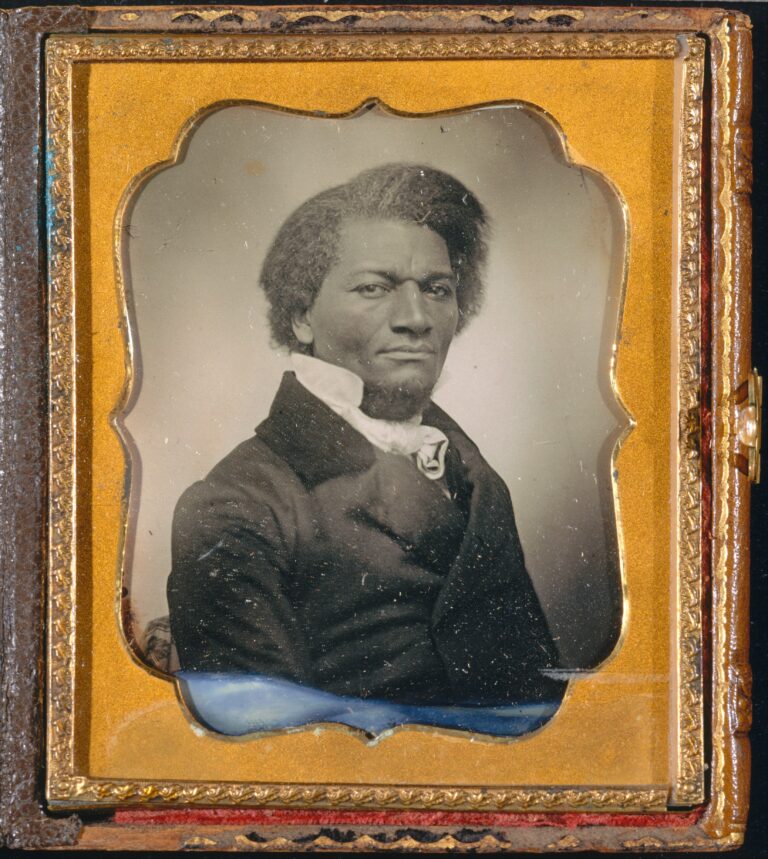Releasing the Hounds: Racial Dog Whistles and the Jacksonville Murders
The toxic mixture of sanctioned violence against Blacks, the misuse of the Second Amendment, and historical fabrication is among the greatest threats to American democracy.

In 1903 W. E. B. DuBois wrote the famed book The Souls of Black Folk, a work that helped solidify the discipline of sociology. DuBois’ examination of American culture prompted a fundamental question about Blacks in society: How does it feel to be a problem?
This question was rooted in his theory of double consciousness: “the psychological challenge African Americans experienced of “always looking at one’s self through the eyes” of a racist white society and “measuring oneself by the means of a nation that looked back in contempt.”The glare of contempt is as assured now as it was in DuBois’ time. As sure as it is today, 120 years later, the question remains much the same: what does it mean to be a problem in America?
The shift in the question moves Blacks away from examining their own consciousness to look at the consciousness of American society, which still sees Black Americans as a problem. The evidence is all around us. Consider voter suppression, which the Supreme Court reinvigorated in a 2013 landmark ruling in Shelby County vs. Holder—after the re-election of Barack Obama. In 2012 he only captured 39% of the White vote and still secured a second term, which was the lowest winning share for any Democrat in a two-way presidential race.
The striking down of Roe V. Wade was not just about abortion: it was simultaneously a form of population control as the country becomes browner, which threatens White political power. A study done by Brookings, which was published in July of 2020, showed more than half of the nation’s population under age 16 identifying as a racial or ethnic minority. This change in the racial landscape has significantly shifted the political landscape with a reduction in the number of White voters. In 1980, two-thirds of the electorate was White and working class; yet roughly 30 years later in 2012, White working class voters were just over a third of the electorate. Political power is first understood through space and place; therefore, the juggernaut of redlining and gentrification turns Black people into the problem within their own often segregated neighborhoods.
While contending with all of these things, Black educational opportunities are denied as the Courts strike down affirmative action in college admissions. The rollback of civil rights means that Black Americans are not seen as worthy of citizenship, which is an attitude with a long racialized history. Thus, in today’s America, Blacks being the problem means Blacks lack the safety to just live.
This lack of basic security results from the distorted fear that American society largely has of Black people. This fear is ultimately rooted in White fragility, as conversations about racism often trigger a range of defensive actions, feelings, and behaviors.
The most pervasive behavior is the hunting of Black people in a variety of ways. During the antebellum period runaway enslaved Africans were hunted down by hound dogs to be brought back to the plantation. Although Black Americans are no longer confined to a plantation, there are spaces, physical and otherwise, in which the society at large believes they shouldn’t be. When Blacks venture away from the proverbial plantation, they confront the danger of being hunted once more.
Blacks are hunted due to racial resentment. A study of racial attitudes from 2011-2019 shows that Whites with high racial resentment scores were more likely to vote for Trump in 2016 (Peterson & Riley, 2022). Trump was the American societal response to the election of the first Black man to the office of president in U.S. history. Trump’s election normalized racial resentment and his subsequent dog whistles declared the opening of hunting season for Blacks. Such resentment allows for the sport of hunting in the housing industry, where Blacks are often cheated in the appraised value of their homes. Blacks are hunted in the financial industry when a Black venture capital fund is being sued for providing capital specifically to women of color. Most frighteningly, Black bodies are still hunted with tools of war justified by the misuse of the Second Amendment.
Opening a hunting season requires weapons. The distortion of the law is pervasive in justifying military weaponry for American civilians. In his book The Second Amendment, Michael Waldman shows how this measure was aimed at addressing public fear surrounding state militias. During the American revolutionary era, there wasn’t a United States Army. Instead the country was governed by the Articles of Confederation, which allowed for individual state militias. To ensure these state militias would not overrun a newly established government, the Second Amendment allowed White males private gun ownership to physically defend against an attack on democracy.
Today, many Americans who obsess about their right to own any style weapon have a distorted, if consistent, view of their role in defending a particular kind of democracy. Consider the examples of Dylan Roof, who killed 9 African-Americans at the Mother Emanuel A.M.E. Church in Charleston, South Carolina; Payton Gendron, who murdered 10 African-Americans at Tops Friendly Markets in Buffalo, New York; and, most recently, Ryan Christopher Palmeter who fatally shot 3 Black people at at a Dollar General in Jacksonville, Florida. All of them believed they were bounty hunters using their weapons to protect the democracy from Black people.
These young White males all left manifestos inspired by White supremacist dog whistles. Recall Donald Trump’s campaign slogan in 2016, “Make America Great Again.” Unleashed as Obama completed his second term in office, the slogan was used to communicate that America was no longer the leader of the free world, and that the inclusion of too many ethnic minorities was a factor in that loss of status. This message was heard clearly across the country. It prompted visceral reactions from those who heard the message curated by a particular sound. For some, the sound was galvanizing and made them feel seen in a society that was quickly changing, and producing feelings of loss. For others, the sound was distasteful and signified that trouble was on the horizon.
The political success produced by the effective use of dog whistles encouraged other politicians to use the whistle in different ways. There has been an all-out assault on democracy with voter suppression efforts grounded in the idea that the democracy needs to be protected from those who are unworthy of participation. In Florida and elsewhere, politicians signaled to migrant workers that their labor is needed, but not their political participation. The insurrection on January 6th showed how the use of dog whistles, intended for command and control, can cause confusion and actually threaten the established democracy hunters are trying to protect. Even as indictments and sentencing for insurrectionists change the political climate, dog whistles are still being used to secure the fragility of Whites.
Florida governor Ron DeSantis has launched his run for the presidency by using similar dog whistles. The most important of these is his support for the erasure of history. DeSantis has signed legislation that allows for the blatant disregard of factual history in regards to slavery. Instead of teaching about the brutality of slavery filled with historic accounts of rape and abuse, Florida teachers will be compelled to teach students that Black people “benefited” from slavery because it taught them useful “skills.” DeSantis has championed such foolery in the protection of Whites who believe they are losing control of “their” country. Such protection signals to those ready to hunt that this is permitted by the state. However, this is not the first time Blacks in the state of Florida have been hunted.
Florida has a historical legacy of hunting Black people. One illustration of this pattern was demonstrated on January 5, 1923. We know this incident as the Rosewood massacre when a mob of over 200 White men attacked the Black community in Rosewood, Florida. White men killed over 30 Black women, men, and children because a White woman claimed she had been assaulted by a Black man who had escaped a prison chain gang. Although there was scant evidence, socially empowered White men burned the town to the ground after the murders, which forced all survivors to permanently flee Rosewood.
This massacre happened 20 years after DuBois published The Souls of Black Folk. It expressly showed that Black freedom and Black community were not to be respected by the likes of White men. The impunity enjoyed by these murderers—and those who would follow on their same political path—has meant that Blacks must fear being hunted by Whites who have historically used their Second Amendment right to collect tools of war for the hunt.
On August 26, 2023 Ryan Christopher Palmeter drove onto the campus of Edward Waters University, the oldest Historically Black College in the state of Florida, to hunt. Those who hunt know that the hunter normally places their camouflage on at the sight of the hunt. It helps to reduce the human body odor on their clothing, which can be detected by the animal they are there to kill. In much the same way, hunters do not return home in clothing they hunted in. While Ryan dressed to hunt Black people at an institution that teaches Black students a curriculum with which he vehemently disagreed, he was spooked. Black students noticed Ryan was out of place. They alerted authorities who confronted Ryan in his car, and he sped off.
The targeting of Edward Waters was no coincidence. From their origins, Historically Black Colleges and Universities (HBCUs) have been committed to helping students grapple with the DuBoisian question asked 120 years ago: How does it feel to be a problem? Predominantly White Institutions (PWIs) have always favored Eurocentric curricula that champion a specific narrative that tends to elevate Western culture; yet, HBCUs have pushed back. In Shelter in a Time of Storm, Jelani Favors shows how HBCUs have always had a second curriculum that counteracted this canon. The second curriculum can be defined as a pedagogy of hope grounded in idealism, race consciousness, and cultural nationalism.

Palmeter’s actions must be understood as an attack on this institution and its commitment to a second curriculum rooted in the truth concerning race in America. His opportunity to hunt was thwarted by vigilant Black students and a heroic campus policeman. Nevertheless his desire to hunt needed to be satisfied: he ultimately killed three Blacks and himself at a Dollar General blocks away. A review of his manifesto, a jumble of perverse dog whistles that he felt justified his actions, shows that this was indeed a racially motivated crime.
Yet the opening of hunting season for Blacks may have been avoidable with the election of Andrew Gillum as governor in Florida instead of DeSantis. In 2017, a year after Donald Trump was elected president, Gillum announced his bid for governor. Gillum is a Florida Agriculture Mechanical University (FAMU) graduate, which is the HBCU land-grant institution established because Blacks couldn’t attend Florida State University across the street. He was aware of the second curriculum taught at HBCUs and leaned into its use as he started his political career. He was the 126th mayor of Tallahassee, the state capital, and understood how to govern amid political stalemate. He became nationally known in a gubernatorial debate where he stated, “I’m not saying Mr. DeSantis is a racist, I’m saying the racists think he’s a racist.” Gillum called DeSantis out on his use of racially motivated dog whistles on national television. This meant that he, as a Black man, had wandered too far believing that the democracy was equally available to him. Subsequently, Gillum had run off the proverbial plantation and needed to be brought back to where societal norms determined he ought to be.
Andrew Gillum was trying to make history becoming only the fourth Black governor in American history. To make matters worse, he was trying to lead the third most populous state, where the tourist industry dominates the state’s economy at $40 billion. He was trying to amass power below the Mason-Dixon Line when racial tensions were at an all-time high in the country. He lost the gubernatorial race by a small margin. Yet his loss was not enough; Gillum needed to understand his place. Although physically alive, Gillum was hunted until his political career was dead. He was publicly humiliated when police released body camera footage of him in a South Beach hotel. He was too inebriated to talk, and the officers were responding to an anonymous call about a suspected drug overdose shortly after Gillum’s election loss. Further suspicions about his character were established when he was investigated for lying to the FBI about gubernatorial campaign contributions.
In May of 2023 Gillum was acquitted of those charges and made the following public statement, “They have quite literally tried to take everything from us. And the beauty, is in our system, the powers that be don’t always get to decide. Everyday people like you and me sometimes get our swing at the ball.”
Yet racism and anti-Black violence were built into the country, leaving Blacks to hit a home run each time they are given the opportunity to swing at the ball. The toxic mixture of sanctioned violence against Blacks, the misuse of the Second Amendment, and historical fabrication is among the greatest threats to American democracy. It’s easy to point the finger at individuals like Trump as the problem, or decide that racial animosity only affects particular regions of the country. However, the erasure of history that examines racial tension is doomed to reproduce that history.
This is one of the many reasons HBCUs are a necessity in the higher educational landscape. They have produced thinkers who produce scholarship that refutesthe narrative of an equitable American society. HBCUs train Blacks to be productive citizens and agents of change in a society that is hostile toward them. These hostilities often produce violent outcomes, including those first legitimized during chattel slavery, designed to terrorize Blacks across the country: such terrorism has indeed produced fear in Black communities and is experienced in different ways across generations. However, there are particular historical moments when the hunting of Black people is more acceptable than others. Jacksonville shows us we are currently in that moment. Therefore, like DuBois, I pose a serious question concerning American society: will Americans continue to choose racial hierarchy at the expense of our democracy?
Dr. Sherice Nelson is a member of the executive board of the Institute for New Global Politics.
References
Du Bois William E. B. The Souls of Black Folk. NY: Penguin, 1982.
Croff R, Hedmann M, Barnes LL. “Whitest City in America: A Smaller Black Community’s Experience of Gentrification, Displacement, and Aging in Place.” Gerontologist. 2021 Nov 15;61(8):1254-1265. doi: 10.1093/geront/gnab041. PMID: 33772304; PMCID: PMC8599195.
Favors, Jelani M. Shelter in a time of Storm: How Black Colleges Fostered Generations of Leadership and Activism. Chapel Hill, North Carolina: University of North Carolina Press, 2020.
Peterson, Clarissa, and Emmitt Y. Riley. Racial Attitudes in America Today: One Nation, Still Divided. New York: Routledge, 2022.
Waldman, Michael. The Second Amendment: A Biography. NY: Simon & Schuster, 2015.



